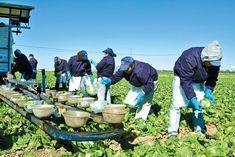
Not far from Alicante airport, surrounded by a dusty, mountainous landscape in what feels like the middle of nowhere, lies the Parque Industrial de Elche, home to the Spain office of Certis Europe. From this unassuming home the division focuses on the protected vegetable market, supplying a number of products for use in integrated crop management.
Covering both Spain and Portugal, the company also provides crop protection solutions for a wide range of other high-value crops, including field veg, top fruit, citrus, strawberries and olives.
Since it was established in 2001, Certis Europe has continually grown and developed, not just geographically but also in terms of embracing the latest technology and adding new products, attracting clients ranging from local farmers to multinationals. In particular, the company has built a reputation for its three strategic areas: soil quality and maintenance, integrated pest management (ipm) and residue elimination.
The philosophy behind its ipm strategy has been to develop high-quality products without impacting the environment, ecosystems or human health. Such issues are hugely important within the fresh produce sector and subject to continued rule changes at national and EU level. “More stringent EU standards in terms of maximum residue limits mean that residue reduction is one of our main priorities,” says Alejandro Jover de la Rubia, account manager at Certis. “This integrated approach to production, which prioritises eco-friendly methods as well as human health, is mainly about minimising the use of phytosanitary toxins.”
At a time when the notion of ecologically sound farming is fast gaining momentum, adding value for producers and consumers alike, it is clear just how important research into the field is. With that in mind, Certis offers ipm programmes and a wide range of zero-residue products that it says enable producers to grow fruit and vegetables efficiently while continuing to comply with EU standards.
One example is the Cleanstart Soil Leadership product line, which has been designed to tackle unwanted weeds, fungus, nematodes and insects, and which can be tailored to suit different soils, crops and environmental challenges. Fertilisers are also available which can prevent or eliminate nutrient deficiencies in a wide range of crops.
Discussion of such products can make them sound complicated and technical, but, observing the methods in action out in the fields, they couldn’t seem simpler.
Dotted all over the blossoming peach fields in Murcia are little plastic containers which attract bees that help pollinate the flowers on the trees. Seemingly unfazed by the bees swarming around them, plantation workers manually remove the flowers from the trees so that they can bear fruit.
“What the market demands is high yields and security,” one plantation owner says. He has seen crops ruined by poor weather and is painfully aware of the importance of healthy soils and plants. “This is a very exacting labour and being able to control the soil’s acidity and nutrients is crucial.” -



